Was ist des Deutschen Vaterland is a German nationalist/German Unification song by Ernst Moritz Arndt (1813) which was popular in the 19th century.
Contents

Was ist des Deutschen Vaterland is a German nationalist/German Unification song by Ernst Moritz Arndt (1813) which was popular in the 19th century.

In the text, Arndt asks the German question and answers it by demanding a Greater German nation-state comprising all German-speaking areas in Europe. The song was performed for the first time in Berlin in 1814. [1]
As the original tune did not become popular, Gustav Reichardt wrote a new melody in 1825. [2] This new tune made the song very popular among the German population that desired the transformation of the German Confederation into a united empire, instead of the previous situation where there were multiple duchies and kingdoms.
Joachim Raff used Reichhardt's tune as a leitmotif in his symphony An das Vaterland. [3]
In 1911, Emil Sembritzki, a German schoolteacher, wrote a song known as "Was ist des Deutschen Tochterland?", which used the 1825 tune and embraced German colonialism. [4]
Arndt enumerates German states and regions and asks whether these particular areas are the fatherland of all Germans. He immediately replies with ″no″ and finally concludes that no particular state or states can be the German fatherland, which is understood to be the entirety of predominantly German-speaking areas.
Was ist des Deutschen Vaterland? | What is the German’s fatherland? |
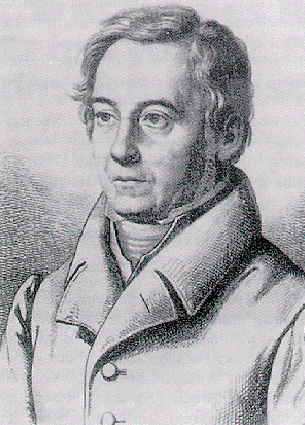
Ernst Moritz Arndt was a German nationalist historian, writer and poet. Early in his life, he fought for the abolition of serfdom, later against Napoleonic dominance over Germany. Arndt had to flee to Sweden for some time due to his anti-French positions. He is one of the main founders of German nationalism during the Napoleonic wars and the 19th century movement for German unification. After the Carlsbad Decrees, the forces of the restoration counted him as a demagogue.
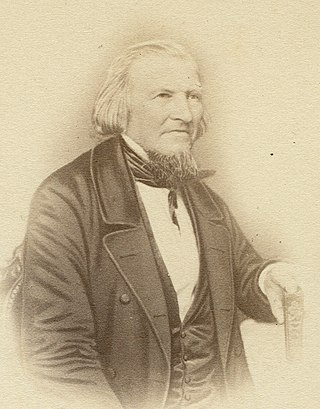
August Heinrich Hoffmann was a German poet. He is best known for writing "Das Lied der Deutschen", whose third stanza is now the national anthem of Germany, and a number of popular children's songs, considered part of the Young Germany movement.
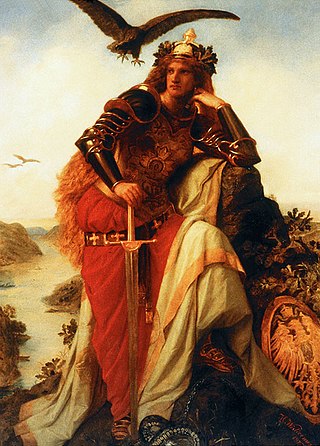
"Die Wacht am Rhein" is a German patriotic anthem. The song's origins are rooted in the historical French–German enmity, and it was particularly popular in Germany during the Franco-Prussian War, World War I, and World War II. The original poem was written by Max Schneckenburger during the Rhine crisis of 1840, and is generally sung to music written by Karl Wilhelm in 1854, seven years after Schneckenburger's death.

Max Schneckenburger was a German poet. The patriotic hymn "Die Wacht am Rhein" uses the text of a poem Schneckenburger wrote in 1840.

The "Schnitzelbank" is a simple song, popular primarily with German Americans.

Johann Gustav Hermes was a German mathematician. Hermes is known for completion of a polygon with 65,537 sides.

"Rufst du, mein Vaterland" was the former national anthem of Switzerland. It had the status of de facto national anthem from the formation of Switzerland as a federal state in the 1840s, until 1961, when it was replaced by the Swiss Psalm.

"Ich hab mich ergeben", originally titled "Gelübde" ("Vow"), is a German patriotic song. The text was written in 1820 by Hans Ferdinand Maßmann. It was one of the unofficial national anthems of West Germany from 1949 until 1952, when the "Deutschlandlied" was officially reinstated. Its tune is now used in the Micronesian national anthem.
"Sei gesegnet ohne Ende", also known as the "Kernstock-Hymne", is a German language song that was the national anthem of Austria from 1929 until 1938. Written by Ottokar Kernstock, it was sung to the famous tune of the imperial Austrian anthem, "Gott erhalte Franz den Kaiser" by Joseph Haydn, later known as the tune of the "Deutschlandlied", which since 1922 has been the national anthem of Germany.

Gustav Reichardt, also Heinrich Wilhelm Ludwig Gustav Reichardt, was a 19th-century German music teacher and composer.

Symphony No. 1 in D major, An das Vaterland, Op. 96, was composed by Joachim Raff between 1859 and 1861.
Vaterlandslied is the name of several patriotic German poems. The most famous one is "Ich bin ein deutsches Mädchen" written by Friedrich Gottlieb Klopstock in 1770 and dedicated to Johanna Elisabeth von Winthem.

"O Deutschland hoch in Ehren" is a patriotic German song written by Ludwig Bauer (1832–1910) in 1859 and set to music by Henry Hugh Pierson. The song was, besides the "Deutschlandlied", "Die Wacht am Rhein" and "Des Deutschen Vaterland", the most popular patriotic anthem in the 19th century.

Christian Gustav Wilhelm Müller was a German zoologist specializing in Ostracoda.
Arminius is an oratorio by the German composer Max Bruch. Bruch wrote the work between 1875 and 1877 during the consolidation of the newly founded German Empire. He picked the story revolving around Arminius and the Cherusci-led defeat of three Roman legions in the Teutoburg Forest in 9 A.D., which served as a German national myth from the 16th to the early 20th century.
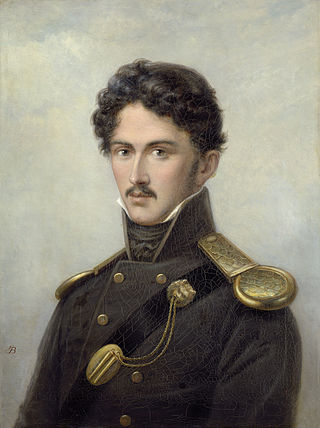
Leyer und Schwert is a patriotic opera in five acts composed by Wendelin Weißheimer to a libretto by Louise Otto-Peters. Also known as Theodor Körner, the opera was composed in 1863/64 and premiered in Munich in 1872. The libretto is based on an episode in the life of the German poet and soldier Theodor Körner.
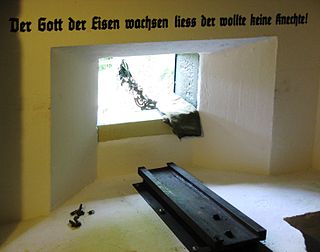
The Vaterlandslied is a patriotic poem written by Ernst Moritz Arndt in 1812. It is also known by its first line Der Gott, der Eisen wachsen ließ.
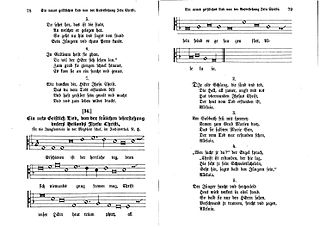
"Erschienen ist der herrlich Tag" is a German Easter hymn, with text and tune written by Nikolaus Herman and published in 1561. It has inspired musical settings by composers from the 17th to the 20th century. It appears in several hymnals, including the German Protestant hymnal Evangelisches Gesangbuch. Other hymns, especially Easter hymns, in both German and English, are sung to the same melody.
Charlotte Pistorius was a German poet and letter-writer. She belonged to the circle of friends around Ernst Moritz Arndt, and corresponded with him and other notable writers, including Friedrich Schleiermacher. She took care of family members, and supported education for the lower classes of the population.

Adolf Schults was a German poet.